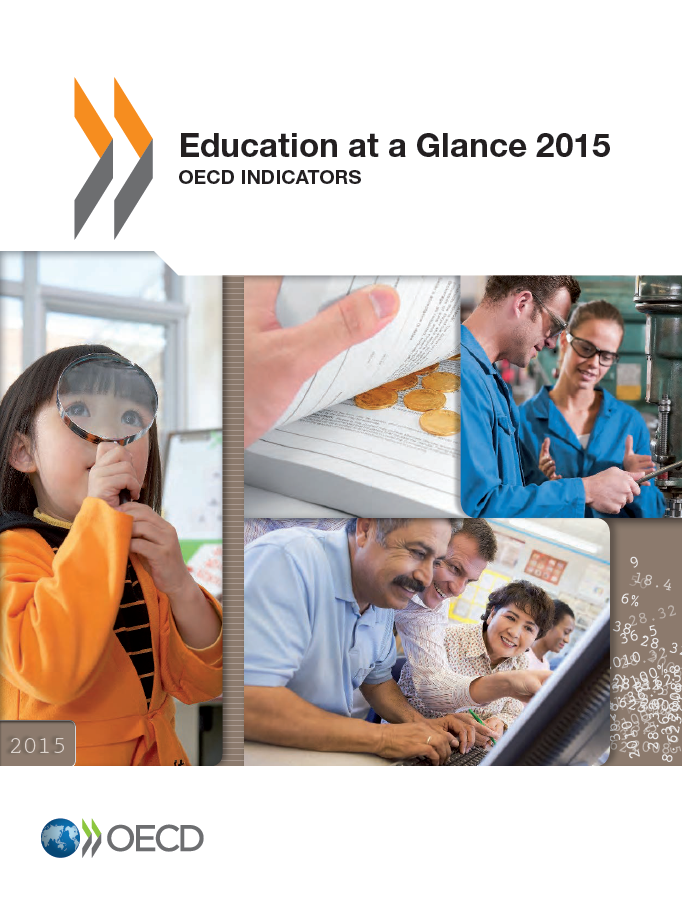Education at a Glance 2015 : OECD indicators

View/
Date
2015Author
OECD. Organisation for Economic Cooperation and Development
Metadata
Show full item recordAbstract
This new edition of Education at a Glance is published only a few weeks after world leaders defined the global ambitions for the next 15 years by adopting 17 Sustainable Development Goals (SDGs) at the United Nations Summit in New York. Education is a cornerstone of the sustainable development agenda, and the education-related goal aims to “ensure inclusive and equitable quality education and promote lifelong learning opportunities for all” by 2030. The goal is composed of ten targets that, together, represent an ambitious commitment to develop better skills for better lives. What is new about this Education 2030 agenda is its focus on expanded access, inclusion and equity, quality and learning outcomes at all levels of education – and for people of all ages. Five of the ten targets are concerned with improving the quality of education for individual children, young people and adults, to ensure that they acquire better and more relevant knowledge and skills. To achieve all of these targets, it is essential that every child has access to and completes a quality education of at least 12 years. Efforts to achieve universal access to education must go hand-in-hand with a renewed focus on education quality and equity. Data from PISA, the global metric used to measure the quality of learning outcomes, show why: many countries can boast that all of their children are enrolled in school, but not all of these children achieve even minimum levels of proficiency in the core subjects of reading, mathematics and science by the end of their lower secondary education. That is why the aim of achieving universal basic skills is at the heart of the SDG education agenda. This shift in focus towards quality in education for all means that the 17 SDGs and the 169 targets are universally relevant: no country, no region in the world can claim in 2015 that all of its youth have attained at least a minimum proficiency in foundation skills. Now that the global community has defined its goal and targets for education, it needs to develop indicators on access, equity and quality that can be measured and tracked over time. These indicators will provide the basis for international accountability and for targeting policies and resources on where they can make the greatest difference. Together with other international organisations, such as UNESCO and its Institute for Statistics (UIS), UNICEF and the World Bank, the OECD stands ready to move this agenda forward. The proposed global indicators for measuring progress towards the education SDG include adaptations of existing international large-scale assessments of
learning outcomes and skills, such as PISA and PIAAC. The indicators reported in Education at a Glance will continue
to provide a strong evidence base for international comparisons of education systems. Indeed, more than two-thirds
of the indicators proposed by the UN system for tracking the education SDG are already covered by existing
OECD policy and data-collection instruments.
Collections
Related items
Showing items related by title, author, creator and subject.
-
Proyecto Educativo Nacional al 2021 : balance y recomendaciones 2018-2020
CNE. Consejo Nacional de Educación; Guzmán Rivas, Almendra; Rosas, Ricardo; Estefanía Sánchez, María Teresa (PEConsejo Nacional de Educación, 2021-07)El Proyecto Educativo Nacional (PEN) propone un horizonte común que oriente las políticas educativas y propicie su continuidad. El PEN fue desarrollado en un momento de transición democrática para el país y, luego de un ... -
Proyecto Educativo Nacional, PEN 2036 : el reto de la ciudadanía plena
CNE. Consejo Nacional de Educación (Consejo Nacional de Educación, 2020-07)La actualización del Proyecto Educativo Nacional —que el Consejo Nacional de Educación presenta al país y a sus autoridades en virtud del encargo recibido por parte del Ministerio de Educación— tiene como intención definir ... -
Elementos para un Plan de desarrollo de la educación peruana (PDEP) 2026 - 2031
Acosta Pantlik, Maritza; Aller Zárate, Román; Alvarado Cerdán, Silvia; Barr Rosso, Paul; Cárdenas Pinto, Tania; Espinoza Peralta, Gustavo; Lema Martínez, Yanina; Quezada Reyes, Zoila; Reyna Motta, Diana Milagros; Rojas Luján, Francisco Fidel; Rosas Lezama, Ricardo; Soto Hurtado, Daniel; CNE. Consejo Nacional de Educación (PEConsejo Nacional de Educación, 2025-11)A cinco años de la aprobación legal del PEN al 2036, persisten problemas estructurales que obstaculizan el logro de sus propósitos: una vida ciudadana afectada por la débil cultura ética, cívica y de legalidad, la desconfianza ...
